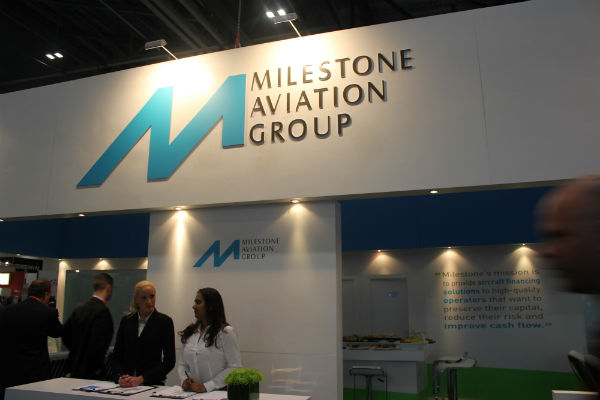Helitech 2014: Gecas buys Milestone Aviation

Milestone Aviation's exhibition at Helitech International 2013 (Photo: Corporate Jet Investor).
The big story at Helitech, this year taking place in a damp Amsterdam, is GE Capital Aviation Services (Gecas) buying Milestone Aviation Group for $1.775 billion.
When Gecas said that it was looking at entering the helicopter leasing market earlier this year, the big question was could it build enough scale with helicopters? One leasing company CEO described this as: “Can helicopters really move the needle for Gecas?” (Ironically just as Gecas was looking, its sister division GE Corporate Aircraft Finance sold its helicopter portfolio to Element Capital.)
He had a point. Gecas’s portfolio of more than 1,600 commercial aircraft is worth around $50 billion. This is about $15 billion less than the estimated total value of the entire commercial helicopter fleet.
Milestone was perhaps Gecas only chance to “move the needle” in 2014. With 168 helicopters worth $2.8 billion and an order and option book worth $3 billion it gives Gecas scale it could not have quickly and profitably built organically.
Milestone’s team will move to Gecas and are committed to staying for three years. They may stay longer. Gecas has managed to keep key talent before, both when it acquired GPA in 1992 and later with its acquisition of commercial debt arranger PK Airfinance. There is a pleasing symmetry to the deal. GE has now bought the first commercial aircraft leasing company and the first new generation commercial helicopter leasing company.
While the acquisition is good news for Milestone’s shareholders, it is a shame that we are not going to see a helicopter initial public offering in the near future (and spare a thought for the investment banks that have missed out on fees). Milestone was ready to float and a few months ago this looked the most likely option. Although Richard Santulli had always said that he was not keen to work for a public company.
The acquisition changes the balance of the helicopter leasing market. We now have three commercial aircraft leasing companies (Gecas, Lease Corporation International and Macquarie Rotorcraft Leasing) competing with a few pure play helicopter leasing companies like Waypoint Leasing and Lobo Leasing.
Rival lessors will be following Milestone even more closely now. Last year Gecas told Airfinance Journal that it needs to originate $6.5 billion of new deals per year just to stay still. Milestone, under its new owner, will clearly be looking to keep taking a significant share of the $20 billion of large helicopters delivering each year.
As a final note, it is worth celebrating Milestone’s achievement. Five years ago it was a business plan being pitched by a bunch of business jet guys. Four years after being launched it is worth $1.7 billion.
Jonathan Baliff warns on equity and tells OEMs to change
Jonathan Baliff, president and CEO of Bristow, warned that the helicopter industry does not have enough equity to cope with a rise in interest rates or tough economic conditions.
“The reason we have $700 million in cash is both to reassure clients that we can survive in tough conditions and so we can take advantage of opportunities in the market,” he said.
He also said that from now on Bristow will ask manufacturers to share performance risk with Bristow.
“We will purchase our aircraft in larger numbers, so we will have fewer types, and we will buy aircraft where there is sharing of availability risk,” says Baliff.
“We will pay for this and there are hundreds of millions of dollars of profit for OEMs that execute this risk sharing through life of the asset.” He argues that this has worked in other industries where “OEMs realise that the real value is in selling razor blades rather than razors.”
He says that this view is shared with other helicopter operator CEOs. “The utility industry did this in the 1950s, the aviation industry did this in the 1980s, the helicopter industry will do this now and into the 2020s” He says that some OEMs are further ahead with this thinking than others.
Thought of the day
Guillaume Faury, CEO of Airbus Helicopters, who returned to Airbus helicopters after five years at carmaker Peugeot, said that the industry needs to adapt faster: “When I returned to Airbus I was shocked at how little the helicopter industry had changed.”
He says that the industry needs to learn from others. He pointed out that Eurocopter last year delivered 500 helicopters whilst Peugeot delivered 60,000 cars a week.
Faury believes that the trend towards urbanization is good news for the helicopter industry. “In 2010 for the first time more people live in cities than outside them,” he says. “This is a massive opportunity for the helicopter industry.”
Subscribe to our free newsletter
For more opinions from Helicopter Investor, subscribe to our email newsletter.






